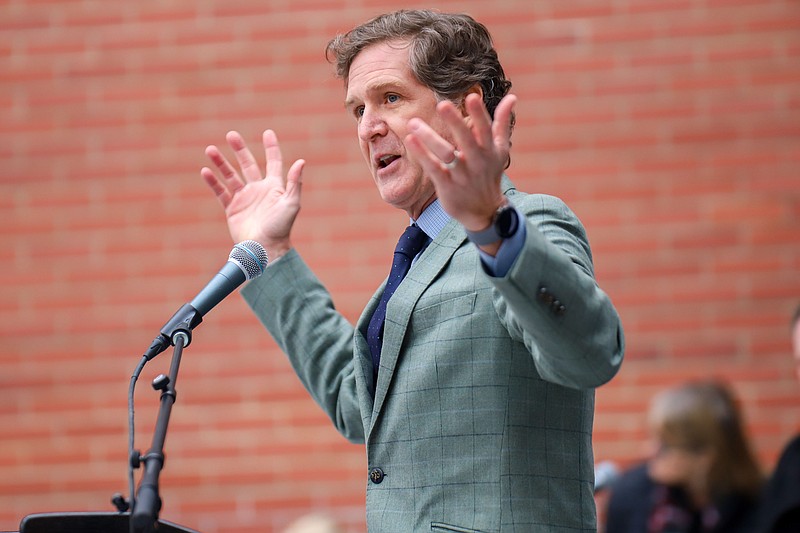Does Chattanooga city government need to be reorganized every eight years or every time a new mayor is elected?
Current Mayor Tim Kelly and his predecessor, Andy Berke, have evidently thought so. Both men spent parts of their first couple of years in office changing the structure of government, saying in essence the previous administration had been a mess.
The pair's three predecessors, while putting their own stamp on city government, felt no such compunction.
Kelly was particularly pointed in remarks to the Times Free Press Sunday, saying "it had been a long time since we had a mayor who was willing to tackle the hard stuff," that some departments his administration inherited were in a "miserable, terrible state," that his administration is having to "fix a lot of past sins that were allowed to fester for essentially organizational neglect and a lack of active management," and that past administrations have "been in many cases kicking the can down the road, sweeping the hard stuff under the rug."
Officials in the mayor's administration said all of his changes are being made to help implement his One Chattanooga plan, which has a goal of closing socio-economic gaps in the city.
"The lift, strategically, I knew was going to be heavy," Kelly said, "but I confess I didn't realize how heavy. ... You would hope you could walk into the city and say, 'Oh, well everybody already sort of knows that,' and they didn't. We still have a lot of work to do to reinstill confidence and trust between the administration and our rank-and-file employees."
It's not like the left-of-center mayor was replacing a right-of-center mayor where the differences could be chalked up to a philosophy of government. No, his predecessor was left-of-center as well and now is working in the Democratic Biden administration.
Similarly, when Berke took office in 2013, replacing the slightly less left-of-center Ron Littlefield, he insisted government needed to be streamlined.
In various remarks that year, Berke said his moves were a "reorienting" of city government, that his administration was "transforming the culture of government," that "we have to be smarter [and] we have to be more effective," that before he was elected "no one in City Hall took responsibility for creating jobs," and that it was necessary for his administration to perform "an exhaustive review of the functions of city government, including each department ... to ensure we are providing the most effective services at the best value to taxpayers."
Coincidentally, both Berke and Kelly saw their roles as similar.
Under his administration, Berke said, the city would have a more corporate structure, with him as the CEO and fewer department heads reporting to him than reported to Littlefield.
Kelly said his job, "as [former U.S. senator and Chattanooga Mayor Bob Corker] has always said, is to be the orchestra conductor for all these elements ... of city government."
When Littlefield took office in 2005 and when Corker was inaugurated in 2001, neither felt the need to take shots at the previous administration.
Though Littlefield and Corker differed in political philosophy, the incoming mayor was effusive in praise for his predecessor.
"This has been the most productive four-year period in Chattanooga's history," Littlefield said in 2005. "We've built a solid foundation, and, as [Corker] has said, the best is yet to come." At his inaugural, he said it would be much easier "to follow a disaster" than to follow Corker's "raging success." Later that year, he remarked that "Corker left a very tough act to follow."
Four years earlier, Corker, whose right-of-center politics were different than those of the slightly left-of-center Jon Kinsey, nevertheless said at his inaugural, "We all here today are indebted to you (Kinsey) for your service." Later that year, he said his administration "had no [structural] changes whatsoever" from Kinsey's term. "We didn't come in with some kind of political ax to grind."
It's no surprise that every mayor wants to put their imprint on city government, but we're not sure city government needs to be reorganized every four or eight years. It's an interruption for the 2,500-plus city employees, an adjustment to those who do business with the city and is not likely to have the impact of such upheaval.
When Berke left office, for instance, he pointed to improving the city's economy, housing the homeless, curbing violent crime, and changing police and fire pensions, some of which might be said to tangentially flow from reorienting government but not directly.
When Kelly leaves office after four or eight years, if he accomplishes some or all of his One Chattanooga plan (with priorities like creating more affordable housing), it won't necessarily be by increasing the size of government (already up 2.6% since he took office) or by shifting duties in various departments. It will happen more through cooperation and collaborative efforts and, yes, a little luck, and often by putting the right money in the right places at the right time.
